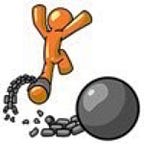Of Daemons, Facts, and Understanding Part I
Designing A Rick Hess “Mini-Me”
What’s your most prominent public skill?
If you’re Frederick M. Hess (who’s piece prompted this), it’s seeing how non-governmental entities can improve K12 learning. ..Plus writing cogently about the same, and gathering people to iterate and push such improvements forward.
What if we wanted to code Rick’s expertise into IBM’s Watson, the supercomputer that beat Ken Jennings, the Jeopardy world champ?
I ask this because it bears on what high school should look like.
Thinking about Rick vs Watson helps us understand how kids learn.
It’s Rick’s excellent series on Practice, Memory, and Expertise that has me pondering. I sensed a gap in them. The same cognitive science gap I feel when people discuss project-based learning and the development of teen “skills”.
Rick deftly employs examples of driving a familiar route vs parallel parking to illustrate the value of both knowledge and practice. Parallel parking is harder (if you rarely do it), because, though it’s simpler, it’s un-practiced. This makes sense.
It also begs many more questions. Like ‘what should you really practice in school to become a better citizen?’ And ‘in school, in the trade-off between practice time and knowledge-acquisition time, how do we choose what teens should do?’
Watson doesn’t swim, play basketball, or do very convincing stage performances. It can, however, recommend treatments for lung cancers, answer questions about wider fields of knowledge, and do other cognitive things not unlike what Rick does. Watson can read and digest texts. It can hypothesize and rank potential answers. When Watson thinks, “more than 100 different techniques are used to analyze natural language, identify sources, find and generate hypotheses, find and score evidence, and merge and rank hypotheses.”
Perhaps we could custom-build an assistant for Rick. [This experiment is more practical than you might think. Anyone can access Watson, for free, in the cloud.]
How to begin? We’ll need to ask two types of questions: First, “What knowledge do we stock our Mini-Rick with?”. These are the ‘facts’ intimated in our title here.
First, “What knowledge do we stock our Mini-Rick with?”.
Watson, on Jeopardy, had access to over 200 million pages of structured and unstructured content. Assuming Rick isn’t quite that well-read, one can still imagine a rather deep stack of knowledge of all kinds, and certainly much that comes in the “education” genre.
What, though, does “structured” content mean? We’d have to look more deeply at Watson. Many “dog is-a mammal” and “cities are-in states” type
assertions? We can guess that Rick’s professional knowledge-structuring gives premium status to policy knowledge, with pedagogy a bit further out and cosmology somewhere at the far periphery. (But brains aren’t 2-D graphs, so it’s important to not take ‘periphery’’ too far. There’s a point in Rick’s expertise where sloshing improves upon structure.)
We might also look at Rick’s structured knowledge as compared to a very different expert in learning — me. My knowledge-base comes to education late; was preceded by lots of domain-specific learning in a breadth of ‘real-world’ classrooms and working situations: optics, radar, Aerospace, land surveying, banking, law, community-building in Appalachia. [Yes, I have my 10,000 hours in learning, like Rick, about education as it’s practiced, and as entrepreneurship might improve the education system.]
Should Mini-Rick mimic or supplement Real Rick in this regard? Interesting tradeoffs at each point of decision.
Second, “What techniques should Mini-Rick readily execute?”
That is, beyond knowledge, we need to give mini-Rick skills of some kind. These are the ‘daemons’ in our title. The choice of that word daemon will need far more explanation.
Remember Watson’s ‘100 different techniques used to analyze natural language, identify sources, find and generate hypotheses, find and score evidence, and merge and rank hypotheses.’? Essentially those techniques will cause tiny computer programs to run on individual bits and bundles of knowledge.
What triggers those tiny programs? Aye, thar’s the magic. And, for Watson, the limitations.
As Watson has moved into more specialized domains than Jeopardy, certainly it’s set of techniques have grown? Or have they? My quick research doesn’t immediately show. Certainly, though, those hundred techniques are what enabled Watson to beat the world at Jeopardy.
Understanding
It’s important to note that an assistant for Rick is far from a replacement for Rick. Watson is designed as a question-answering machine. Rick, on the other hand, gets paid the big bucks to ask good, important questions. There’s a big difference. Understanding comes at many levels.
In truth, where I’m going is not to build a better Rick, but a better high-school grad. What we seek is to build better citizen soldiers, citizen-plumbers, citizen-cable-guy’s, citizen-hot-dog-casing-stuffers. All through the vehicle of the public high school.
Everyone agrees that high school has reached a point of overdue radical reinvention. Past that, however, the agreement completely falls apart.
In Part II we’ll look at ways of viewing high school graduates ‘public skills’; how we might view them through the lens of IBM Watson’s design.
No, we’re not trying to program teens. We’re looking to better understand them. Machines like Watson are hardly new, or unique. What can they tell us about teen learning?
Ed Jones may or may not be the world’s expert in the future of high school. He’s bootstrapping a Statewide Experiment in Customized Teen Learning, leads the Hackable High Schools movement, and once redesigned the world’s most complex software/electronics system. He works to publish the book Hacking High School, Making School Work for All Teens, and lives & works (usually) in Appalachian Ohio.
